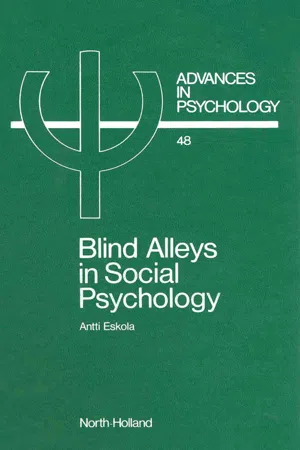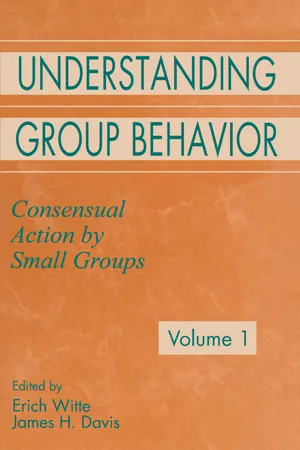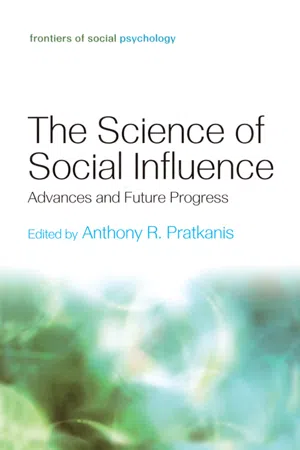Psychology
Social Impact Theory
Social Impact Theory, proposed by Bibb Latané, suggests that the influence of others on an individual's behavior depends on the strength, immediacy, and number of people exerting the influence. It emphasizes the impact of social forces on individual behavior and highlights the importance of group size, proximity, and strength of the source in shaping social influence.
Written by Perlego with AI-assistance
Related key terms
1 of 5
6 Key excerpts on "Social Impact Theory"
- eBook - PDF
- Roderick M. Kramer, Margaret A. Neale, Roderick M Kramer, Margaret A. Neale(Authors)
- 1998(Publication Date)
- SAGE Publications, Inc(Publisher)
M uch of social psychology, historically, has focused on the under-standing of social influence. One of the fundamental facts of social life is that people influence each other, for better or worse. Education is about influence. Communication is about influence. Or-ganization, child rearing, coercion, and advertising are all about influ-ence. As social psychologists study variables that affect behavior, they are studying variables that influence or have a causal connection to behavior, and in this uninteresting sense one can claim that all of social psychology is about influence. The more interesting sense is the explicit emphasis on social influ-ence. Social Impact Theory (Latané, 1981), theories of persuasion and attitude change (Eagly & Chaiken, 1993), social power (French & Raven, 1959), social conformity (Crutchfield, 1955), and the explicit analysis of the strategies that people use to influence each other (Cialdini, 1993) all focus on the processes that are involved when people change the beliefs or behavior of others or both. 181 8 Some Ethical Aspects of the Social Psychology of Social Influence DAVID M.MESSICK RAFAL . OHME 182 POWER AND INFLUENCE IN ORGANIZATIONS Intentional influence represents the subfield of social psychology that we focus on in this chapter. The prototypical situation that we have in mind contains a minimum of two elements: an agent of influence, the influencer, and a target of influence, the influenced. As Latané (1981) noted in his Social Impact Theory, the agent or the target or both can be either single or multiple persons. What further characterizes this prototypical situation is that the agent wishes, prefers, or desires some outcome that the target can bring about. The influence episode(s) consists of the efforts made by the agent to achieve a desired outcome by having the target perform some action or actions. - eBook - PDF
- John P. Houston, Helen Bee, David C. Rimm(Authors)
- 2013(Publication Date)
- Academic Press(Publisher)
There is no way we can completely divorce social influ-ences from the study of any aspect of behavior—nor would we want to. But most psychologists in other areas prefer to study the behavior of a single individual at a time, while most social psychologists focus on the behavior of people in pairs or groups or the influence of one person on another. As Baron and Byrne define it (1977, p. 4), social psychology is the scientific field that seeks to investigate the manner in which the behavior, feelings, or thoughts of one individual are influenced or determined by the behavior and/or characteristics of others. Davis, Loughlin, and Komorita (1976) put it still more briefly: Social psychology may be defined as the study of human interaction. 458 Chapter 14 Social behavior The common ingredient in these definitions is the relationship of one person to another. Since we relate to others in so many different ways— individually, in groups, in crowds, in casual or intimate contacts—the field of social psychology is enormously diverse. Social psychologists have broadened their field of interest further by studying not just social behavior, but also the ways ideas and attitudes (cog-nitions) are influenced by encounters with others and how our emotions influence others and are influenced by them. Thus there are at least three levels of analysis within social psychology. Individual social psychology theorists tend to emphasize one of these levels at a time, so that there are some heavily cognitive theories, some that emphasize emotions, and some that focus almost entirely on overt behavior. Moreover, some social psychologists have chosen to study the intra-personal aspects of social encounters, such as the attitudes we have, the emotions we feel about others, and the judgments we make about other people. Others deal with interpersonal or dyadic (two person) interactions, such as the processes of attraction between individuals and the develop-ment of enduring relationships. - eBook - PDF
Blind Alleys in Social Psychology
A Search for Ways Out
- A. Eskola, A. Kihlström, D. Kivinen, K. Weckroth, O.-H. Ylijoki(Authors)
- 1988(Publication Date)
- North Holland(Publisher)
Rather, ‘‘( ...I the forces of the environment and the laws of their operation (. . .) can be discovered only by proceeding from certain total situations that are simple but well defined in their concrete individuality”; by a method “which usually implies experi- ment and systematic variation of conditions” (Lewin 1935, 69). Third, the concept of social interaction developed above is no longer as individually-centred as the concept of social influence. There is more to in- teraction than individuals and influence relations between individuals. It emerges out of a social structure that leads people to cooperation; and things emerge out of it that we could not have predicted on the basis of the individuals involved and their qualities. Thus, the social psychology con- cerned with social interaction has a lot in common with what is known as ‘ scciological’ social psychology. The tragic internal contradiction which hampers progress within this tradition is that so many ‘sociological’ social psychologists (such as Rosenberg and Turner 1981, xv) adhere - at least implicitly - to the thesis that the social can be reduced to individuals. We now have a simple explanation for the asymmetry mentioned by Liska (1977) that most representatives of ‘sociological’ social psychology refer to the results of ‘psychological’ social psychology, whereas the represen- How Many Social Psychologies Are There? 37 tatives of the latter school, psychologists, pay little or no attention to ‘scciological’ social psychology. There is no reason to suspect that psychologists are more arrogant or narrow-minded than sociologists. The imbalance follows logically from the different focuses of the two traditions. Social influence is one aspect or moment of social interaction, which is the object proper of ‘sociological’ social psychology. This is why scientists within this tradition are also interested in research into influence. But there is more to social interaction than social influence. - eBook - ePub
Understanding Group Behavior
Volume 1: Consensual Action By Small Groups; Volume 2: Small Group Processes and Interpersonal Relations
- Erich H. Witte, James H. Davis(Authors)
- 2013(Publication Date)
- Psychology Press(Publisher)
Table 11.1 ). The concrete integration of these ideas into EGST is a task for the future. It shows, however, how a theoretical core can be used to implement more and more complex conditions.The hitherto existing combination of the different concepts has shown those empirical effects on which each approach is grounded, and that the concepts are not counterparts, but complements explaining individual behavior in small groups. Social Impact Theory explains the influence of normative information on the individual reaction without further discussion, a concept that might also be extended in the future to discussion-group settings. The influence depends on that social and behavioral force field, which is a direct extension of this theory, if the theory is further specified.The social decision schemes, on the contrary, are concentrated—from the perspective of EGST—on informational influence without normative aspects. Different rules mean a different integration of informational elements so that the basis of decision schemes are found in the transformation of individual reactions before discussion into reactions after discussion.The research on communication structures has to do with the weighting of the individual reactions as a means of determining the group standard. This research is thus more specific than the decision schemes because the concept contains the individual characteristics of the group members.Finally, the explanations of some interesting empirical effects, if they are accepted as such, has been a test of the EGST as a connection between theory and empirical data. In the future, many more such reconstructions and, of course, more direct predictions are necessary. EGST is only a theoretical framework within which to build a middle-range theory of individual behavior in small-group situations. Its prediction has been tested on the level of an average individual so that the individual variation has been eliminated. This corresponds with the usual test of means, which ignores the standard deviation. In the future, the individual reactions themselves have to be reconstructed or predicted. Such a strategy will lead to the introduction of personality variables and other individual characteristics as necessary predictors of individual reactions, and as a means of reducing the error variance. - eBook - PDF
The Science of Social Influence
Advances and Future Progress
- Anthony R. Pratkanis(Author)
- 2011(Publication Date)
- Psychology Press(Publisher)
The purpose of this journal is to publish empirical and theoretical articles on all topics related to social influence (for more details, go to http:// www.tandf.co.uk/journals/titles/15534510.asp). The significance of this journal is made clear by looking over the reference sections of the chapters in this book. If you do so, you will find that the references are scattered across journals and disciplines, making it difficult for a researcher to stay abreast of the issues. Hopefully, Social Influence will address this need. Historically, social psychology was the primary discipline interested in the topic of social influence and much of the basic research on this topic was published THE SCIENCE OF SOCIAL INFLUENCE 10 in its flagship journals (Journal of Personality and Social Psychology, Journal of Experimental Social Psychology, and Personality and Social Psychology Bulletin). The discipline of social psychology has given us the core findings of Sherif, Asch, Milgram, and others. However, in recent years, social psychology has pursued a more cognitivistic agenda, with the result that some of the best social influence research in social psychology often appears on the fringes (in places such as Journal of Applied Social Psychology). The flagship journals of social psychology remain an excellent archival source of research. - eBook - PDF
Social Influence Network Theory
A Sociological Examination of Small Group Dynamics
- Noah E. Friedkin, Eugene C. Johnsen(Authors)
- 2011(Publication Date)
- Cambridge University Press(Publisher)
Along the same lines, we believe that it is worthwhile to base an understanding of social psychological phenomena in groups on formal models of social process that describe how individuals respond to the more or less dynamic (changing) condi- tions in which they are situated. Groups, large and small, are where we study the process of interpersonal influence on individuals’ attitudes, and we aim to derive conclusions about the effects of group structure and other group-related phenomena from this influence process. F. Allport remarked that The study of groups is, in fact, the province of the special science of sociology. While the social psychologist studies the individual in the group, the sociologist deals with the group as a whole. He discusses its formation, solidarity, continuity, and change. (1924: 10) The idea that psychologists should be concerned with individuals and sociologists should be concerned with groups was probably never defen- sible, and it is certainly outmoded now in the minds of most sociolo- gists. Social psychologists sometimes refer to the problem of integrat- ing groups and individuals in terms of a distinction between group-level and individual-level variables that may affect individual outcomes. With respect to these two types of variables, psychologists’ interest has become increasingly focused on the cognitive conditions and intra- individual processes that explain individuals’ thoughts, feelings, and behaviors. Sociologists have been more interested in the effects of socio- demographic conditions on individuals in their environments. The integration of group and individual-level explanatory variables is typically accomplished with contextual-effects models of individuals’ thoughts, feelings, or behaviors.
Index pages curate the most relevant extracts from our library of academic textbooks. They’ve been created using an in-house natural language model (NLM), each adding context and meaning to key research topics.





